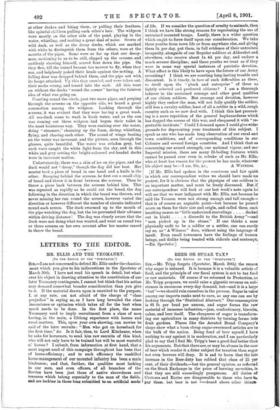LETTERS TO THE EDITOR.
MR. ELLIS AND THE YEOMANRY.
(TO THE EDITOR OF THE "SPECTATOR.")
Snt,—I am not concerned to defend Mr. Ellis under the chastise- ment which you give to his indiscretions in the Spectator of March 30th. I have not read his speech in detail, but what- ever his object in drawing attention to the constitution of our later Yeomanry contingents, I cannot but think that his action may demand somewhat broader consideration than you give to it. If the material drawn upon is unsuited to the purpose, I, at any rate, am not afraid of the charge of "class prejudice" in saying so, as I have long bewailed the class insouciance or optimism which takes all for the best when much needs to be done. In the first place, the name Yeomanry used to imply recruitment from a class of men having, in the main, a lifelong experience with horses and rural matters. This, upon your own showing, can nowise be said of the later recruits : "Men who got on horseback for the first time," &c. Is it fair, then, to Lord Kitchener, when he asks for horsemen, to send him raw recruits of this kind, who will not only have to be trained but will be most wasteful oZ horses ? I submit, from information at first hand, that a most urgent need of this campaign throughout has been that of horse-efficiency; and to such efficiency the unskilled horse-management of our mounted infantry has been a main hindrance; and that, further, the qualities most lacking in our men, and even officers, of all branches of the Service have been just those of native shrewdness and resource which belong especially to the man of the fields, and are lacking in those long submitted to an artificial mode of life. If we consider the question of cruelty to animals, then - I think we have like strong reasons for reprobating the use of.. untrained mounted troops. Lastly, there is a wider question: which ought to force itself upon our consideration. We take these youths from town life or from anywhere else, and giving them 5s. per day, put them, in full evidence of their untrained incapacity, alongside of our Regular soldiers at Aldershot and, elsewhere, who receive about 19. 4d. per day, and endure a much severer discipline; and these youths we treat as if they were in some way special instances of patriotic devotion. What effect is this likely to have upon the future of our Army recruiting? I think we are courting long-lasting trouble and discontent. Is it timely, in face of such difficulties as these, to dwell upon the pluck and enterprise" of these so lightly selected and preferred citizens? I am a thorough believer in the sustained courage and other good qualities of our citizen soldiers. But courage and devotion, however highly they endow the man, will not fully qualify the soldier, still less a cavalry soldier, least of all a settler in a wild, rough country such as we now deal with. I think this last proceed- ing is a mere repetition of the general haphazardness which- has dogged the course of this war, and chequered it with "re- grettable incidents." Could I demand space I could give wider grounds for deprecating your treatment of this subject. I speak as one who has made long observation of our rural and town conditions, and of corresponding conditions in our Colonies and several foreign countries. And I think that as concerning our armed strength, our national vigour, and our- Imperial mission, there are many ill-boding features which cannot be passed over even in rebuke of such as Mr. Ellis; who at least has reason for the protest he has made, whatever his object may be.—I am, Sir, &c., A WITNESS.
[If Mr. Ellis had spoken in the courteous and fair spirit. inwhich our correspondent writes we should have made no protest, for it is obvious that the physique of our soldiers is an important matter, and must be freely discussed. But If' our correspondent will look at our last week's note again he. will see that we were indignant with Mr. Ellis, not because he said the Yeomen were not strong enough and tall enough— that is of course an arguable point—but because he poured scorn on them for their size and origin, and called them, such insulting names as "little undersized starvelings . . . . decked out in khaki . . . . a discredit to the British Army "—and. "men picked up in the slums." If one thinks a mail physically unfit to be a soldier or a settler, one can surely say so, as ".A Witness" does, without using the language of insult. Even small townsmen have the feelings of human beings, and dislike being treated with ridicule and contempt.. —En. Spectator.]






































 Previous page
Previous page